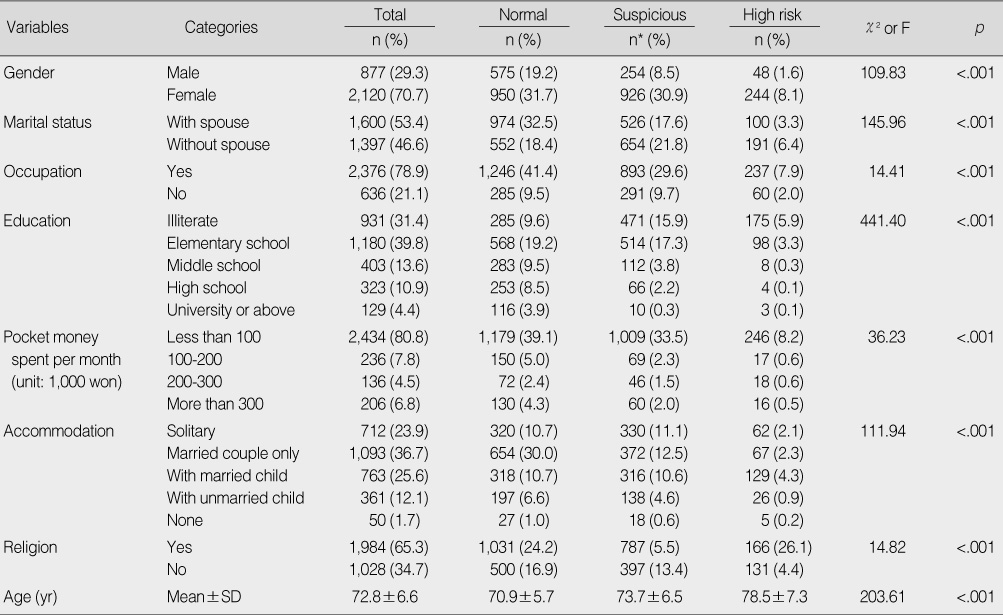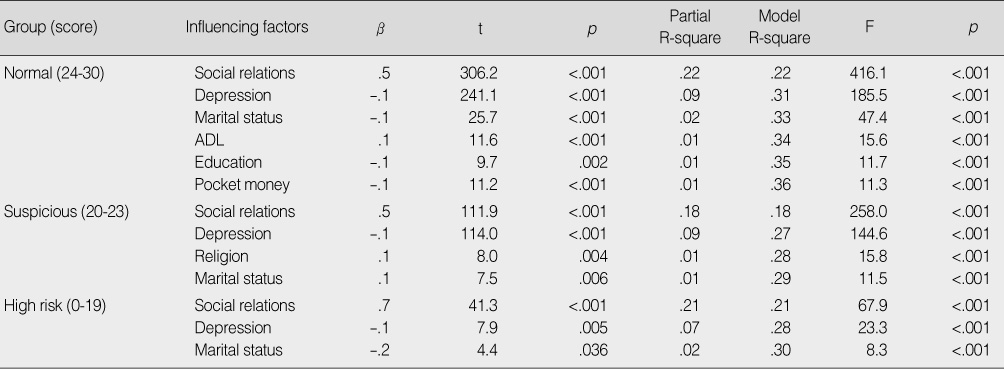Articles
- Page Path
- HOME > J Korean Acad Nurs > Volume 39(5); 2009 > Article
-
Original Article
- A Comparison of the Factors Influencing the Life Satisfaction of the Elderly According to their Cognitive Impairment Level
- Rah Il Hwang, Ji Young Lim, Young Whee Lee
-
Journal of Korean Academy of Nursing 2009;39(5):622-631.
DOI: https://doi.org/10.4040/jkan.2009.39.5.622
Published online: October 31, 2009
1Senior Researcher, National Health Insurance Cooperation, Seoul, Korea.
2Professor, Department of Nursing, Inha University, Incheon, Korea.
- Address reprint requests to: Lim, Ji Young. Department of Nursing, Inha University, 253 Younghyeon-dong, Nam-gu, Incheon 402-751, Korea. Tel: 82-32-860-8210, Fax: 82-32-874-5880, lim20712@inha.ac.kr
Copyright © 2009 Korean Society of Nursing Science
Abstract
-
Purpose
- This study was conducted to analyze the factors that influence the life satisfaction of the elderly according to their cognitive impairment level.
-
Methods
- This study was conducted by dividing 3,012 elderly residents of a regional community into three groups based on the scores of the Korean version of the Mini-Mental State Examination: a normal group without any cognitive impairment, a suspicious group with a mild level of cognitive impairment, and a high risk group with a high level of cognitive impairment. Researchers made phone calls, house calls, and personal visits to health centers and shelters for the elderly to gather the information required for this study.
-
Results
- The results of this study revealed that social relationships, depression, and activities of daily living had a significant impact on life satisfaction for the normal group, while social relationships and depression had a high impact on life satisfaction for the suspicious group, and social relationships had high impact on the life satisfaction of the high risk group.
-
Conclusion
- Based on the results of this study, we suggest that programs that promote development of the social relationship networks of the elderly should be established to promote their life satisfaction.
- 1. An J, An K, O'Connor L, Wexler S. Life satisfaction, self-esteem, and perceived health status among elder Korean women: Focus on living arrangements. Journal of Transcultural Nursing. 2008;19:151–160.ArticlePubMedPDF
- 2. Aquino JA, Russell W, Cutrona CE, Altmaier EM. Employment status, social support, and life satisfaction among the elderly. Journal of Counseling Psychology. 1996;43:480–489.Article
- 3. Bowling A, Farquhar M, Grundy E, Formby J. Changes in life satisfaction over a two and a half year period among very elderly people living in London. Social Science and Medicine. 1993;36:641–655.ArticlePubMed
- 4. Byeon YC. A study on development of dementia management mapping. 1997;Unpublished manuscript, Korean Institute for Health and Social Affairs.
- 5. Byrne-Davis LM, Bennett PD, Wilcock GK. How are quality of life ratings made? Toward a model of quality of life in people with dementia. Quality of Life Research. 2006;15:855–865.ArticlePubMedPDF
- 6. Chou KL, Chi I. Determinants of life satisfaction in Hong Kong Chinese elderly: A longitudinal study. Aging and Mental Health. 1999;3:328–335.Article
- 7. Chou KL, Chi I. Successful aging among the young-old, old-old, and oldest-old Chinese. International Journal of Aging and Human Development. 2002;54:1–14.ArticlePubMedPDF
- 8. Everard K. The relationship between reasons for activity and older adult well being. Journal of Applied Gerontology. 1999;18:325–340.ArticlePDF
- 9. Forsell Y, Jorm AF, Winblad B. Association of age, sex, cognitive dysfunction, and disability with major depressive symptoms in an elderly sample. The American Journal of Psychiatry. 1994;151:1600–1604.ArticlePubMed
- 10. Hong SH. A comparative study of social support network among the elderly groups with and without dementia or depression. Journal of Korea Gerontological Society. 1999;19:113–128.
- 11. Katz S, Akpom CA. 12 index of ADL. Medical Care. 1976;14:116–118.Article
- 12. Kim GB. Prospect and situation of elderly dementia. The Korean Nurse. 1998;37:16–24.
- 13. Kim J, Jeong I, Kim Y, Hwang S, Choi B. Screening for high risk population of dementia and development of the preventive program using web. Journal of Korean Academy of Nursing. 2003;33:236–245.ArticlePDF
- 14. Kim J, Shin I, Kim S, Yang S, Jeong S, Park K, et al. Correlates of activities of daily living in demented and non-demented elderly. Journal of the Korean Neurological Association. 2005;23:199–205.
- 15. Kim SH, Chi SA. An analysis of the relationship between the social support and the health state of the old. Chung-Ang Journal of Medicine. 1985;10:123–142.
- 16. Kwon JD, Cho JJ. A study of factors influencing the life satisfaction of the aged. Journal of the Korea Gerontological Society. 2000;20(3):61–76.
- 17. Kwon YC, Park J. Korean version of mini-mental state examination (MMSE-K) part I: Development of the test for the elderly. Journal of the Korean Neuropsychiatric Association. 1989;28:125–135.
- 18. Lawton MP, Brody EM. Assessment of older people: Self-maintaining and instrumental activities of daily living. Gerontologist. 1969;9:179–186.ArticlePubMed
- 19. Lee BJ. Study on the improvement of elderly women's quality of life related to their daily activity level. 2001;Seoul, Kyunghee University. Unpublished masters thesis.
- 20. Lee HJ. The relationship among depression, self-esteem and life satisfaction of elderly institution residents. 2005;Seoul, Ehwa Women University. Unpublished master's thesis.
- 21. Lee HS, Kim JH, Go HJ, Ku HM, Kwon EJ, Shin JY, et al. The standardization of the geriatric quality of life scale-dementia (GQOL-D). Journal of the Korean Geriatrics Society. 2004;8:151–164.
- 22. Lee KJ, Lee SY. A study on the factors influencing depression among elderly people with and without dementia. The Korean Journal of Fundamentals of Nursing. 2004;11:166–176.
- 23. Li Y, Meyer JS, Thornby J. Depressive symptoms among cognitively normal versus cognitively impaired elderly subjects. International Journal of Geriatric Psychiatry. 2001;16:455–461.ArticlePubMed
- 24. Newsom J, Schultz R. Social support as a mediator in the relation between functional status and quality of life in older adults. Psychology and Aging. 1996;11:34–44.ArticlePubMed
- 25. Oh MA, Shin YO, Lee TY, Kim JS. A study on the cognitive function by MMSE in the urban elderly. Chungnam Medical Journal. 2003;30:101–113.
- 26. Park J, Kwon YC. Standardization of Korean version of the mini-mental state examination (MMSE-K) for use in the eldery part II: Diagnostic validity. Journal of the Korean Neuropsychiatric Association. 1989;28:508–513.
- 27. Ryu HS. A study on ADL and dementia of aged person with medicaid in Korea. Journal of Korean Academy of Nursing. 2001;31:139–149.ArticlePDF
- 28. Sato S, Demura S, Kobayashi H, Nagasawa Y. The relationship and its change with aging between ADL and daily life satisfaction characteristics in independent Japanese elderly living at home. Journal of Physiological Anthropology and Applied Human Science. 2002;21:195–204.ArticlePubMed
- 29. Sheikh JI, Yesavage JA. A knowledge assessment test for geriatric psychiatry. Hospital and Community Psychiatry. 1985;36:1160–1166.ArticlePubMed
- 30. Shin K, Byeon YS, Kang Y, Oak J. A study on physical symptom, activity of daily living, and health-related quality of life (HRQoL) in the community-dwelling older adults. Journal of Korean Academy of Nursing. 2008;38:437–444.ArticlePubMed
- 31. Sparks M, Zehr D, Painter B. Predictors of life satisfaction: Perceptions of older community-dwelling adults. Journal of Gerontological Nursing. 2004;30(8):47–53.Article
REFERENCES
Figure & Data
REFERENCES
Citations

- The Influence of Social Dynamics on Biological Aging and the Health of Historically Marginalized Populations: A Biopsychosocial Model for Health Disparities
Lok Ming Tam, Kristin Hocker, Tamala David, Edith Marie Williams
International Journal of Environmental Research and Public Health.2024; 21(5): 554. CrossRef - The Actor-Partner Effects of Marital Satisfaction on Life Satisfaction in Middle-Aged and Older Couples: Focusing on the Mediating Effects of Health Behavior and Health
Eun Jee Lee, Ju Hee Park
Human Ecology Research.2023; 61(4): 615. CrossRef - Factors Affecting Life Satisfaction of Older Adults in Asia: A Systematic Review
Sonia Khodabakhsh
Journal of Happiness Studies.2022; 23(3): 1289. CrossRef - Mediating Effect of Cognitive Function on the Relationship Between Geriatric Oral Health and Quality of Life Among Korean Seniors
Eun Jee Chang, Hyun-Jae Woo, Kyu-Hyoung Jeong
Journal of Preventive Medicine and Public Health.2022; 55(1): 106. CrossRef - The impact of computer-based cognitive training intervention on the quality of life among elderly people: a randomized clinical trial
Leila kazazi, Mohsen Shati, Seyede Salehe Mortazavi, Vahid Nejati, Mahshid Foroughan
Trials.2021;[Epub] CrossRef - Social Support, Activities of Daily Living, and Depression among Older Japanese and Koreans Immigrants in the U.S
Bumjung Kim, Hyeyoun Jun, Jisun Lee, Yun Min Kim
Social Work in Public Health.2020; 35(4): 163. CrossRef - Evaluating the Efficacy of Therapeutic Programs on Improving Cognitive Function and Depression among Older Adults Living with Dementia in Korea
Jaeeon Yoo, Sunhee Lee
International Journal of Environmental Research and Public Health.2020; 17(9): 3218. CrossRef - Risk Factors to Cognitive Function and Life Satisfaction in Elderly Living Alone
Jee Young Lee
Stress.2018; 26(4): 259. CrossRef - Relationship of health, sociodemographic, and economic factors and life satisfaction in young-old and old-old elderly: a cross-sectional analysis of data from the Korean Longitudinal Study of Aging
Jin-Won Noh, Kyoung-Beom Kim, Ju Hyun Lee, Min Hee Kim, Young Dae Kwon
Journal of Physical Therapy Science.2017; 29(9): 1483. CrossRef - Correlation between physical function, cognitive function, and health-related quality of life in elderly persons
DeokJu Kim
Journal of Physical Therapy Science.2016; 28(6): 1844. CrossRef - Factors Influencing Quality of Caregiving by Caregivers for Elders with Dementia
Chan Mi Kang, Jung Soon Kim, Jeong Hee Jeong
Journal of Korean Academy of Community Health Nursing.2016; 27(3): 193. CrossRef - Effect of Hoelen Cum Radix on learning and memory enhancement via stimulation of neuronal differentiation in the hippocampus of the mouse brain
Jin Gyu Choi, Yeomoon Sim, Wonnam Kim, Sun Yeou Kim, Myung Sook Oh
The Korea Journal of Herbology.2015; 30(2): 43. CrossRef - The Relationship Between Activities of Daily Living (ADL), Chronic Diseases, and Depression Among Older Korean Immigrants
Bum Jung Kim, Young Choi
Educational Gerontology.2015; 41(6): 417. CrossRef - The Effects of an Individual Cognitive Improvement Program on the Elderly with Mild Cognitive Impairments
Inhyae Park, In-Hee Choi, Seo Young Kang, Younkyoung Kim, Chong Mi Lee
Journal of Korean Academy of Community Health Nursing.2015; 26(1): 1. CrossRef - Factors Affecting Activities of Daily Living, Depression and Life Satisfaction among Aged Women
Journal of East-West Nursing Research.2015; 21(2): 119. CrossRef - Family Caregivers’ Coping Resources and Life Satisfaction
Ji Seon Hwang, Hey Jung Jun, Eun Jee Lee
Family and Environment Research.2015; 53(5): 519. CrossRef - Impact of Cognitive Function and Self-efficacy on Medication Adherence of Elderly Patients with Chronic Disease
Kyung-Hee Ryu, Youn-Jung Son
Journal of Korean Biological Nursing Science.2013; 15(3): 107. CrossRef - Effects of Art Therapy on Cognition, Depression, and Quality of Life in Elderly
Yeon Hee Choi, En Young Jeon
Journal of Korean Academy of Community Health Nursing.2013; 24(3): 323. CrossRef - The relationship between social support and functional capacity in elderly persons with cognitive alterations
Tábatta Renata Pereira de Brito, Sofia Cristina Iost Pavarini
Revista Latino-Americana de Enfermagem.2012; 20(4): 677. CrossRef - Factors Influencing Depression of Elderly Women in a Metropolitan City
Seung-Ae Yang
Journal of Korean Public Health Nursing.2012; 26(1): 158. CrossRef - The Effects of a Cognitive Enhancement Group Training Program for Community-dwelling Elders
Young Ran Han, Mi Sook Song, Ji Young Lim
Journal of Korean Academy of Nursing.2010; 40(5): 724. CrossRef
General Characteristics of Subjects according to Level of Cognitive Impairment (N=3,012)
*Missing value excluded.
Mean of MMSE-K Score (N=3,012)
MMSE-K=Mini-Mental Screening Examination-Korea.
Scores of Research Variables in the Elderly according to Level of Cognitive Impairment (N=3,012)
ADL=activities of daily living.
A Comparison of the Influencing Factors in Elderly Life Satisfaction according to Level of Cognitive Impairment (N=3,012)
ADL=activities of daily living.
*Missing value excluded.
MMSE-K=Mini-Mental Screening Examination-Korea.
ADL=activities of daily living.
ADL=activities of daily living.
 KSNS
KSNS
 E-SUBMISSION
E-SUBMISSION




 Cite
Cite

